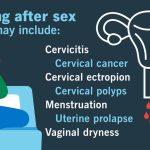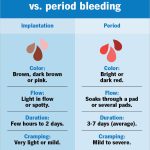Are you tired of being caught off guard every month, wondering why your body decides to surprise you with some extra bleeding after sex? You’re not alone! Many women experience light bleeding or spotting after their period, but when it happens after intercourse, it can be alarming and leave you feeling frustrated.
After My Period: Bleeding After Sex – Causes, Prevention and Treatment
In this blog post, we’ll dive into the world of post-intercourse bleeding and explore its possible causes, prevention strategies, and treatment options. Whether you’re experiencing it for the first time or are a seasoned veteran of the menstrual cycle, you won’t want to miss this in-depth look at what’s happening behind closed doors.
What’s Normal and What’s Not?
Before we get into the nitty-gritty of bleeding after sex, let’s define what’s considered normal. In general, light bleeding or spotting is common during the first few days after a period, as your body adjusts to hormonal changes. However, when this bleeding occurs after intercourse, it can be a sign of something more significant going on.
One possible cause of post-intercourse bleeding is cervix irritation. When you have sex, your cervix is stimulated, which can lead to temporary inflammation and light bleeding. This is especially true if you’re not using any lubricant or are experiencing a high amount of friction during intercourse.
In our next section, we’ll explore more potential causes of post-intercourse bleeding, from hormonal imbalances to underlying medical conditions. Stay tuned for the full scoop on what’s happening behind closed doors!
Now that we’ve established what’s considered normal, let’s dive deeper into the potential causes of bleeding after sex.
Possible Causes of Bleeding After Sex
As mentioned earlier, cervix irritation is one possible cause. However, there are other factors to consider:
Hormonal imbalances: Fluctuations in estrogen and progesterone levels can lead to irregular bleeding or spotting after sex.
Endometriosis: This condition occurs when tissue similar to the lining of the uterus grows outside the uterine cavity, leading to abnormal bleeding patterns, including post-intercourse bleeding.
Fibroids: Uterine fibroids can cause heavy or irregular menstrual bleeding, as well as spotting after sex due to inflammation and irritation.
Polycystic Ovary Syndrome (PCOS): Women with PCOS may experience irregular periods, including light bleeding or spotting after intercourse.
Vaginal dryness: A lack of lubrication during sex can cause minor tears in the vaginal lining, leading to bleeding or spotting.
Sexually transmitted infections (STIs): Certain STIs, such as chlamydia or gonorrhea, can cause cervix inflammation and subsequent bleeding after sex.
In addition to these medical factors, other lifestyle choices can contribute to post-intercourse bleeding:
Smoking: Smoking can increase the risk of cervical cancer and lead to abnormal bleeding patterns, including spotting after sex.
Stress: High levels of stress can disrupt hormone balances and lead to irregular menstrual cycles, including light bleeding or spotting after intercourse.
If you’re experiencing persistent or heavy bleeding after sex, it’s essential to consult with your healthcare provider to rule out any underlying medical conditions. In the meantime, here are some preventive measures you can take:
Use lubricants: Apply a water-based or silicone-based lubricant to reduce friction and irritation during sex.
Practice good hygiene: Clean yourself thoroughly before and after sex, and avoid using scented soaps or douches that can disrupt the natural balance of your vagina.
In our next section, we’ll explore treatment options for bleeding after sex, from hormone-based therapies to lifestyle changes. Stay tuned for a comprehensive guide on how to address this common issue!
Get Expert Medical Guidance
Still have questions about bleeding after sex? Our medical experts are here to help.
Start chatIn this final section, we’ll summarize the key points covered so far and provide some parting insights to help you better understand bleeding after sex.
Key Takeaways
We’ve explored the possible causes of post-intercourse bleeding, from cervix irritation to hormonal imbalances and underlying medical conditions. We’ve also touched on prevention strategies, such as using lubricants during intercourse and practicing good hygiene. But what’s the takeaway?
The most important thing to remember is that bleeding after sex is not always a cause for alarm. In many cases, it’s a normal part of your menstrual cycle or a temporary side effect of cervical stimulation. However, if you’re experiencing heavy or prolonged bleeding, it’s always best to consult with a healthcare professional to rule out any underlying conditions.
Final Insights
So what can you do to minimize the likelihood of post-intercourse bleeding? Here are some final thoughts:
- Practice good hygiene: Make sure to clean yourself thoroughly after sex, and consider using a gentle cleanser to reduce irritation.
- Use lubricants: Lubricants can help reduce friction during intercourse and minimize the risk of cervix irritation.
- Communicate with your partner: If you’re experiencing bleeding after sex, talk to your partner about it. They may be able to adjust their technique or suggest alternative positions that could reduce the likelihood of further bleeding.
A Strong Conclusion
In conclusion, bleeding after sex is a common phenomenon that can be caused by a range of factors. By understanding the possible causes and taking steps to prevent it, you can minimize the risk of post-intercourse bleeding and enjoy a more comfortable and confident sexual experience. Remember: if you’re concerned about your bleeding or are experiencing heavy or prolonged periods, consult with a healthcare professional for personalized advice and guidance.
Red bumps on head of penis: Have you noticed red bumps on the head of your penis? Find out what’s causing this common condition and learn how to treat it. Don’t let this embarrassing issue hold you back any longer!
The best dog for a single female living in an apartment: Are you a single female looking for the perfect furry companion to keep you company in your apartment? Discover the top breeds that are perfect for city living and learn how to choose the right dog for your lifestyle.



